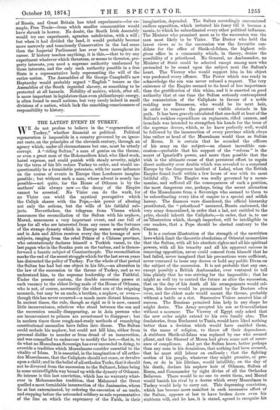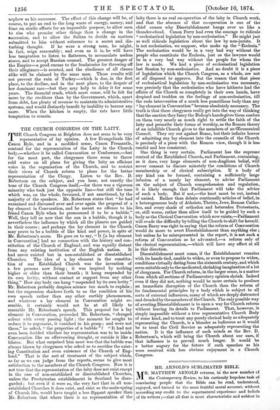'11:11, LATEST EVENT IN I URICEY.
VVE do not profess to believe in the "regeneration of Turkey," whether financial or political. Political regeneration is impossible in a country governed by an ignor- ant caste, on the principles of the eleventh century, through an agency which, under all circumstances but one, must be utterly corrupt. A "riding Sultan," a man of genius on the throne, or even a great man of the Hohenzollern kind, who liked work, hated expense, and could punish with steady severity, might for the term of his life reduce Turkey to order, and would un- questionably be a formidable potentate, with far more influence on the course of events in Europe than Londoners imagine possible ; but without such a man, whose advent is nearly im- possible—not quite, for the House of Othman is by the mothers' side always new — the decay of the Empire cannot be arrested: No Vizier can do the work, for no Vizier can wield the mystical prerogative which the Caliph shares with the Pope,—his power of altering not only the actions, but the wills of his faithful sub- jects. Nevertheless, the telegram from Vienna which announces the reconciliation of the Sultan with his nephew, Murad, announces a very important event, and one full of hope for all who are interested from any cause in the fortunes of the strange dynasty which in Europe seems scarcely alive, and in Asia and Africa receives every day the homage of new subjects, ranging from the rebel Prince of a Chinese province, who ostentatiously declares himself a Turkish vassal, to the last pagan who in the Soudan puts on the turban, and is thence- forward a fanatic subject of Constantinople. The reconciliation marks the end of the secret struggle which for the last seven years has distracted the policy of Turkey. For the whole of that period the Sultan has had but one object in his life,—an alteration in the law of the succession to the throne of Turkey, and as we understand him, to the supreme leadership of the Faithful. Under the present custom, the double succession passes at each vacancy to the eldest living male of the House of Othman, who is not, of course, necessarily the eldest son of the reigning monarch, but may be an uncle, a brother, a nephew, or even— though this has never occurred—a much more distant kinsman. In ancient times, the rule, though as rigid as it is now, caused little inconvenience' relatives who stood between the son and the succession usually disappearing, as in Asia persbna who are inconvenient to princes are accustomed to disappear • but in modern times those rough-and-ready methods of remedying constitutional anomalies have fallen into disuse. The Sultan could seclude his nephew, but could not kill him, either from personal dislike to murder or from dread of an insurrection, and was compelled to endeavour to modify the law,—that is, to do what no Mussulman Sovereign has ever succeeded in doing, to override a tradition which Mussulmans consider essential to the vitality of Islam. It is essential, in the imagination of all ortho- dox Mussulmans, that the Caliphate should not cease or devolve upon a child; and in the belief of all orthodox Turks, that it should not be divorced from the succession to the Snitanet, Islam being in some unintelligible way bound up with the dynasty of Othman So intense is this last conviction, which has no warranty what- ever in Mohammedan tradition, that Mahmoud the Great quelled a most formidable insurrection of the Janissaries, whom he at last exterminated, by ordering the execution of an uncle, and stepping before the astounded soldiery as sole representative of the line on which the supremacy of the Faith, in their
imagination, depended. The Sultan accordingly encountered endless opposition, which irritated his fancy till it became a mania, to which he subordinated every other political influence. The Minister who promised most as to the succession was the man most likely to be Vizier. The Doctor who held the laxest views as to the succession was the favourite can- didate for the office of Sheik-ul-Islam, the highest reli- gious office in a community which, in theory, denies the possibility of a priesthood. No General, no Ambassador, no Minister of State could be selected except among men who pretended to be sound upon the subject next the Sultan's heart. The Viceroy who would support him in his object was pardoned every offence. The Power which was ready to acknowledge the son was never refused a request. The very existence of the Empire seemed to its head of less importance than the gratification of this whim, and it is asserted on good authority that at one time the Sultan seriously contemplated the renunciation of the Caliphate in favour of a noble residing near Damascus, who would be its next heir, in order to remove the greatest visible obstacle in his path. It has been gravely calculated that one-half at least of the Sultan's reckless expenditure on regiments, rifled cannon, and ironclads was intended to strengthen his hands for the issue of the supreme decree, which, as he knew perfectly well, would be followed by the insurrection of every province which obeys him rather as head of the Mussulman world than as Sultan of Bourn. It is certain that he sounded the officers of his army on the subject—an almost incredible con- cession—probable that his support of the " reform " is the secret of Ignatieff's power, and more than possible that the wish is the ultimate cause of that persistent effort to regain direct authority over Arabia which was revealed to a surprised Europe by the dangerous incident of Lahej, when the British Empire found itself within a few hours of war with its most faithful ally. The Empire was really governed by a mono- maniac, and suffered all the consequences of such a position, the most dangerous one, perhaps, being the secret alienation of the Mussulmans -from a Sovereign who seemed to them to be subordinating every idea of empire to a special and selfish heresy. The finances were disordered, the official hierarchy prostituted, the " priesthood " menaced, Russia embraced, the very army demoralised, in order that a lad, not entitled to the prize, should inherit the Caliphate,—in order, that is, to use anillustration which, though imperfect, will be intelligible to our readers, that a Pope should be elected contrary to the Canons.
It is a curious illustration of the strength of the unwritten laws which limit the theoretic absolutism of Oriental monarchies that the Sultan, with all his absolute rights and all his spiritual powers, with all his tenacity and all his apparent success in removing opposition, never could conceal from himself that he had failed, never imagined that his precautions were sufficient, never ventured to issue any decree or hold any public Divan on the subject of the succession. It is not probable that any one, except possibly a British Ambassador, ever ventured to tell him plainly that he was striving for the impossible ; that he might as well try to control the future as alter the succession, that on the day of his death all his arrangements would col- lapse, his decree would be pronounced by the Doctors ultra vires, and the eldest male would mount the throne, probably without a battle or a riot. Successive Viziers assured him of success. The Russians promised him help in any shape he might desire. The Army accepted his son as Generalissimo without a murmur. The Viceroy of Egypt only asked that the new order might extend to his own family also. The feudatories, from Bucharest to Tunis, would have liked nothing better than a decision which would have enabled them, in the name of religion, to throw off their dependence. A stubborn Sheik-ul-Islam was replaced by one who seemed pliant, and the Shereef of Mecca had given some sort of assur- ance of compliance. And yet the Sultan knew, better perhaps than any man in his dominions, that nothing had been secured, that he must still labour on endlessly ; that the fighting section of his people, whatever they might promise, or pro- fess, or do in his lifetime, would infallibly, on the day of his death, declare his nephew heir of Othman, Sultan of Bourn, and Commander by right divine of all the Orthodox Believers. There would be no one to resist them, and Murad would banish his rival by a decree which every Mussulman in Turkey would help to carry out. This depressing conviction, which has become more manifest in each successive effort of the Sultan, appears at last to have broken down even his stubborn will, and he has, it is stated, agreed to recognise his nephew as his successor. The effect of this change will be, of course, to put an end to the long waste of energy, money, and time on sterile efforts for an impossible purpose, to allow men to rise who promise other things than a change in the succession, and to allow the Sultan to decide on matters submitted to him without reference to a secret and dis- turbing thought. If he were a strong man, he might, in fact, reign reasonably ; and even as it is, he will have less temptation to listen to flatterers, to accumulate useless stores, and to accept Russian counsel. The greatest danger of the Empire—a good excuse to the feudatories for throwing off their allegiance—is averted, and the obedience of all classes alike will be claimed by the same man. Those results will not prevent the ruin of Turkey—which is due, in the first place, to the decline, and in the next place, to the despair of her dominant race—but they may help to delay it for some years. The financial crash, which must come, will be felt far more by the creditors than by the Government, which, apart from debt, has plenty of revenue to maintain its administrative systems, and would distinctly benefit by inability to borrow any more. When the kitchen is empty, the rats have little temptation to remain.







































 Previous page
Previous page